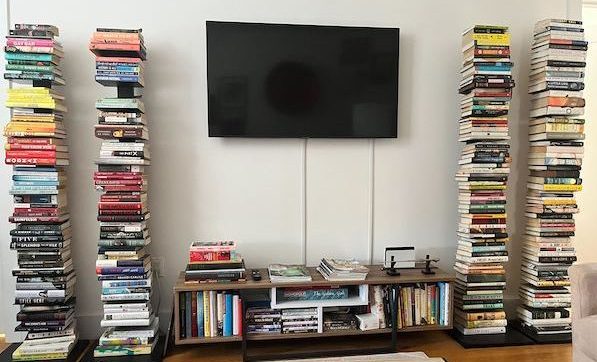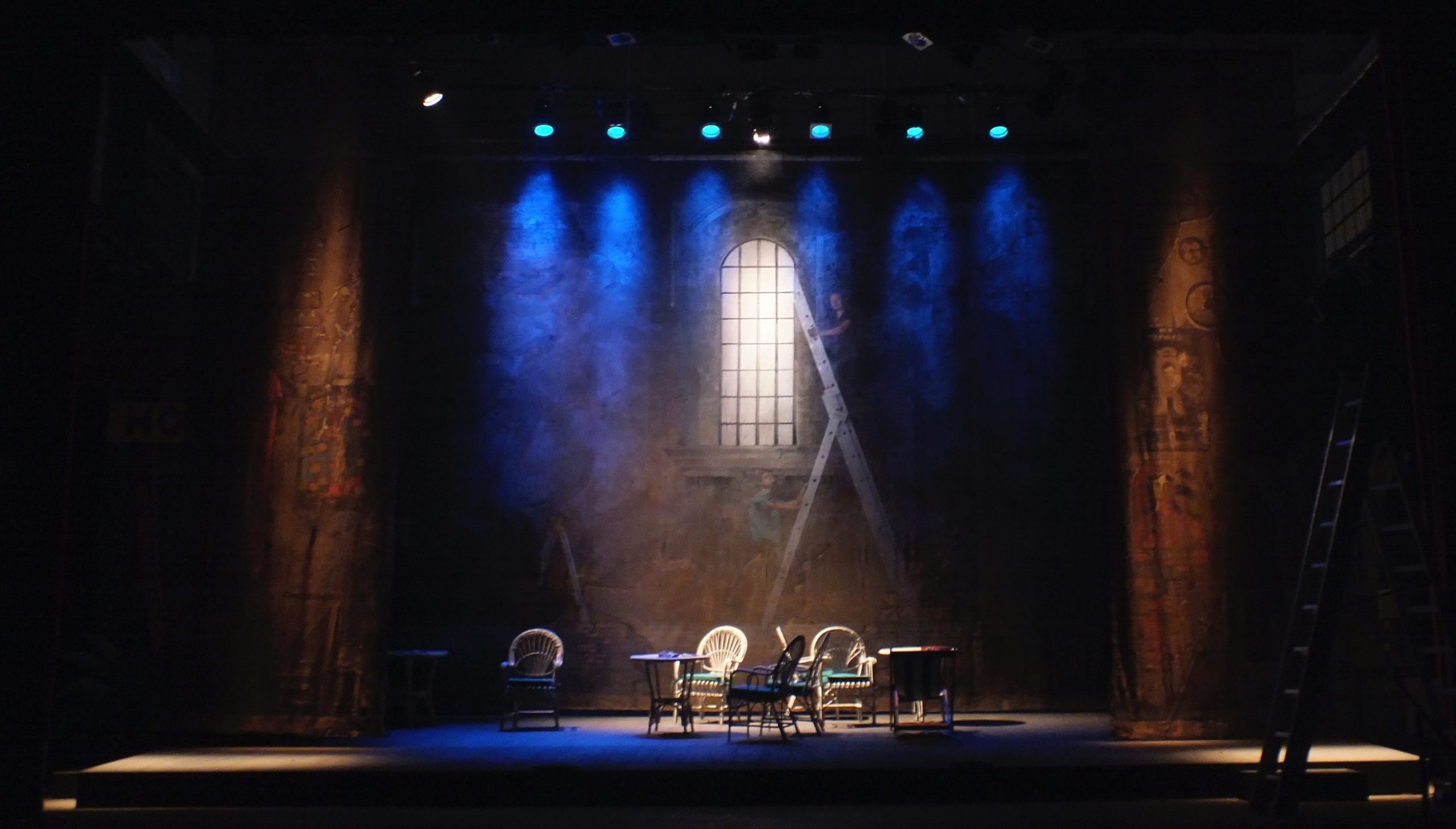Books & Culture
In Defense of Sophie Turner, It’s Nearly Impossible to Be a “Good Mother”
The expectation of erasing oneself and sacrificing everything for your children is crushing

My daughter was ten months old when I abandoned her for the first time, for five days. I went to an academic conference to present on a prestigious panel. I wobbled up to a podium in long-neglected heels, my breasts aching against my navy, polka-dot dress. I tried to blink away the hundreds of faces you rarely see at academic talks and willed my breastmilk to stay put, to not stain the straining fabric, to not bloom in blotches and betray me as not professional, not serious, not someone who deserved to be there.
I wrote my paper for the panel mostly in the very early morning, after my daughter’s 4am feeding, when she latched onto me like a hungry animal after a long stretch of sleep. I’d stay up after lying her gently back in bed, so gently the process took about ten minutes, and sit on a faux black leather Ikea couch to try and finish my dissertation. I was still teaching in the evenings and weekends when my partner was home from his full-time job and able to watch our daughter. I pumped milk at 8pm in a dirty locker room at the City University of New York’s technical college, City Tech, and collapsed into co-sleep upon returning home.
I, myself, am also a bad mother: I work, and I dare to enjoy it.
I was tired, but this was a career-making panel—the Shakespeare Association of America’s Next Generation Plenary, featuring work by the next generation of Shakespeare scholars. A committee selected papers via blind review out of almost one hundred. The first time I attended this panel, years earlier, I knew I could do it. And I did, but as my voice shook and I willed my breasts not to leak, my body reminded me I was not supposed to be away from my daughter.
The talk went well. After, I cried while pumping in my hotel room. The woman I shared it with—a colleague with no children—walked in on me. I still remember her face, a mixture of pity and disgust.
I was at my parents’ house, sitting across from my mother, when I first heard the news that Joe Jonas had filed for divorce from Sophie Turner. My mother announced it, looking up from her phone, and we all gasped—long-time Jonas Brothers fans. Joe used to be my favorite. Nick, my little sister’s, Kevin, my mom’s. I went to one of their concerts years ago and haven’t felt that kind of electricity since. The uncontainable, desirous screams of thousands of young girls rung in my ears for days after.
I looked up the headlines for myself, in utter disbelief. TMZ broke the story, reporting that the couple was headed for divorce and that, for months, they had been experiencing “serious problems” in their marriage. As for why, sources told TMZ that Jonas had been caring for the couple’s daughters “pretty much all the time” over the past three months. Subsequent articles claimed that part of the reason for the divorce was that Turner “likes to party” while Jonas “likes to stay at home.” The source also claimed divorce was a “last resort” for Jonas.
Rage spread through my body as I realized the insinuation behind these articles. I’ve become an expert in bad mothers over the past few years, designing and teaching a college course on the topic. I, myself, am also a bad mother: I work, and I dare to enjoy it; I leave my child with her father for extended amounts of time. Like Edna in Kate Chopin’s The Awakening, I tend to my daughter in an “uneven, impulsive way”—struggling to play with her, to look up from my phone when she calls for me.
When reading the headlines about Turner, I thought about how “partying” signals, in part, unbridled sexuality—and how maternal sexuality has long been demonized in narratives from William Shakespeare’s Hamlet to Kristen Arnett’s With Teeth. I thought about how, in 2022, Turner told Elle UK, “I miss England so much… for my mental health, I have to be around my friends and family… I’m slowly dragging my husband back,” and how Euripides’ Medea, a foreigner, is betrayed and banished by her husband. I thought about all the artist-mothers, from Edna in Chopin’s The Awakening to the mother in Rachel Yoder’s Nightbitch, to Mia in Celeste Ng’s Little Fires Everywhere, that have struggled to marry their desire to create art with the intensive mothering our patriarchal society demands.
‘Turner was trying to make up for her lost youth partying,’ my mother said.
Generations of bad mothers have taught me that, no matter what Turner may or may not have been caught doing on a Ring camera, the dictates of motherhood are painful—violent, even—to bear. Sophie Turner has privileges many mothers cannot even imagine and yet even she cannot escape these narratives, cannot measure up to what patriarchy deems a good, successful mother. As a rich, white woman, she certainly had the opportunity to be seen as a good mother (unlike, Black mothers, for example, who, too often, do not even have the luxury of being presumed good mothers, and who must contend with a whole set of different myths). That Turner did not make use of her endless resources to fully devote herself to her daughters makes her even more villainous in the public eye.
The weight of these expectations, to erase oneself and sacrifice everything for your children, is crushing.
As the titular character sometimes thinks in Nightbitch, “I imagine abandoning my family, abandoning this entire life.” “It’s all on me,” she laments—“every part of it.”
Later, in a group text with me and my sister, my mother reiterated the headlines: Turner was too young to get married, she said. Turner was trying to make up for her lost youth partying, she said. I’m glad the girls are with Joe’s people, she said. In my opinion, she said, mothers shouldn’t be away from their children for more than five days—if they’re under five.
I felt like I’d been slapped. Surely, my mother remembered all of my trips to conferences, all of my invited talks, that one month I traveled twice and my partner sat me down and told me it was really hard on my daughter, really hard on the family.
“Are you saying I’m a bad mother?” I asked her.
“Were you ever away from her for more than five days?” she responded.
About to type back, I remember how my mother had to put me in daycare when I was six weeks old. It’s where I became attached to my baby blanket, the transitional object I fell asleep with until I was twenty-six years old. One time, a worker at my daycare told my mother I was walking along the other cribs, holding onto the bars, stealing blankets from the other babies. One time, they told her nonchalantly that I cried all day.
My mother was always there for us when we needed her. My daughter won’t experience this, and it pains me.
As the story goes, my mother quit her job before she’d have to go back after my sister was born. My father didn’t know how they were going to make it. My mother promised she would use cloth diapers, figure it out. She did figure it out, and proceeded to stay home with her four children, as she wanted, while my father’s career flourished, supporting him along the way. She was always home to bring us something to school we forgot, to drive us to band practice, theater, other appointments. She was always there for us when we needed her.
My daughter won’t experience this, me being on call all hours of the day, and it pains me.
Perhaps this is why I nastily said to my mother, “as your daughters know, some of us can’t up and quit their jobs when they want to.” My sister, a lawyer, and I are both the breadwinners of our families.
“Do you think I wasn’t scared to death?” she responded, then swiftly said, “This is just a fight about celebrity gossip. I’m done.”
A few days after the news of Turner and Jonas’s divorce broke, Jonas was spotted out to breakfast with the couple’s children. “Joe Jonas is spending time with his girls,” People reported. A convenient sighting, to say the least. At Dodger Stadium in Los Angeles, Jonas addressed the crowd before singing “Hesitate,” a song he wrote inspired by his love for Turner: “It’s been a crazy week. I just want to say, if you don’t hear it from these lips, don’t believe it. Okay?”
As the news continued to roll in, I read that Jonas pressured Turner to attend events postpartum, one source saying he “forced” her while she was struggling after giving birth. Sources report she didn’t want to leave her home, didn’t want to be photographed at events, but, still, she attended them with him. At another, that Jonas attended alone, he “complained” that Sophie was MIA, “felt she needed to get out more.”
In the most recent development, Turner has sued Jonas, demanding their children return to England—the filing said he was withholding their passports and that Turner learned of the divorce through the media.
My sister sent me a video of Joe Jonas celebrating his birthday on tour, posted about a month before he filed for divorce. “It’s all about me today. It’s all about me,” he tells the crowd.
As People reports, Sophie Turner is also back at work. In images captured since news of the divorce broke, the edges of her body and face are angular, her eyes narrowed, her lips curled up in a pained, almost smile. In one image, her back—covered in a white-web, a temporary tattoo—faces the camera. She clasps her phone in one hand, facing a forest, her right leg lifted as if to step forward.
It’s a vision that reminds me of Edna in The Awakening swimming out to sea, trying to escape. Unlike Edna, though, I hope Turner turns around and swims back. I hope she feels an iota of freedom being away, being free to create art—and that she relishes it. But I know she is also in pain, even if it is only because the narratives that working mothers are bad mothers live in our own heads as much as they reside in headlines. I hope she’s surrounded by family and friends that will tell her she deserves it all, even if all doesn’t feel quite like what we were promised. I hope her daughters grow up knowing they can be anything, because they watched their mother do it—claim herself, her time, in the face of everything.
I know that there is so much distance between Turner and I, but I feel close to her. I feel a need to protect her. I want to hold her hand and hug her and cry with her and tell her that I get it, that she has it so much worse than I do, that she is subject to a million women who feel they have a right to judge her, to argue that her daughters deserve better.
I want to go out with her and dance as if we never became subject to the scrutiny that accompanies motherhood.
“I think you have doubts within yourself that make you defend Sophie,” my mother texted me, towards the end of our fight. She’s right. Still, there has been an explosion of feminist coverage pushing back on the insinuations in the media’s coverage of this divorce, that Turner is a bad mother. I hope she sees these pieces; they certainly have helped me.
I want to go out with her and dance as if we never became subject to the scrutiny that accompanies motherhood.
I’m writing this piece at 4AM as my daughter sleeps. Many mornings when I get up early to work, however, she gets up with me. I give her an iPad and she watches videos where parents play with their children as I type away and try to block out the sounds of better, more involved parents than I. My partner usually comes downstairs after waking up a bit later and raises his eyebrows, “How long has she been up?” I usually give him a withering glance. This is our routine.
Last night, as my daughter’s eyes grew heavy, I put my phone on the lowest brightness and typed some of this piece, with one hand, into my notes app. Her skull pressed against me, I felt her breathing grow slower against my side, the fuzz from her unicorn lovey tickling my cheek. I raised my arm painfully, slowly, and lifted myself up, ready to go downstairs and type on my computer. Her eyes popped open—“Mommy?” she said, looking at me with betrayal.
“I’m here baby.” I responded, thinking about the dance so many of us do, daily, in order to have it all.








